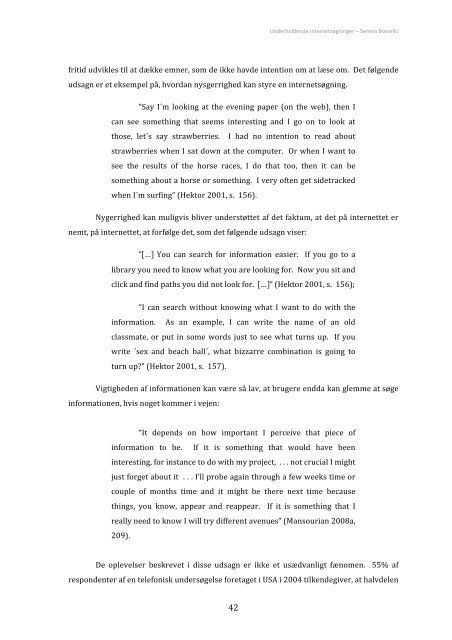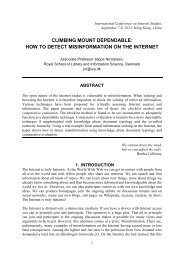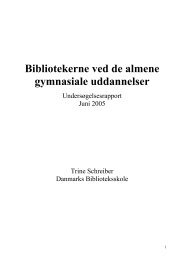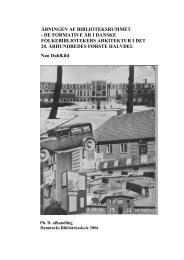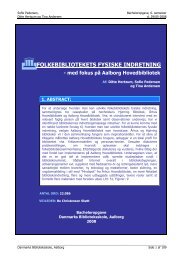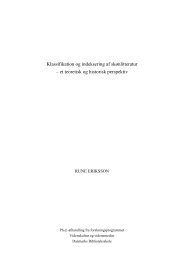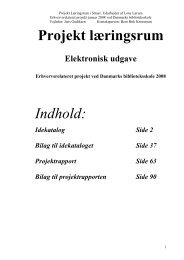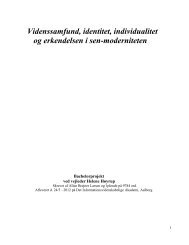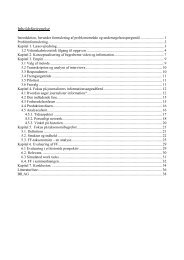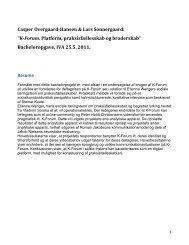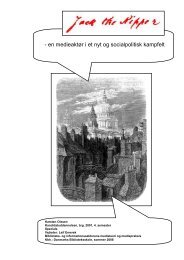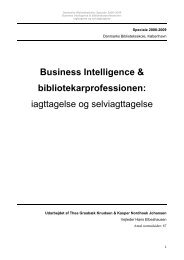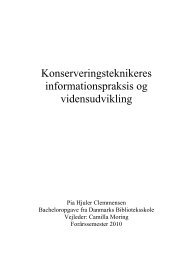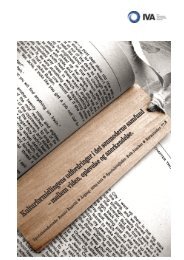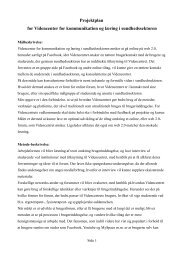Hvorfor er det sjovt at surfe på nettet? - Forskning
Hvorfor er det sjovt at surfe på nettet? - Forskning
Hvorfor er det sjovt at surfe på nettet? - Forskning
Create successful ePaper yourself
Turn your PDF publications into a flip-book with our unique Google optimized e-Paper software.
42<br />
Und<strong>er</strong>holdende int<strong>er</strong>netsøgning<strong>er</strong> – S<strong>er</strong>ena Borsello<br />
fritid udvikles til <strong>at</strong> dække emn<strong>er</strong>, som de ikke havde intention om <strong>at</strong> læse om. Det følgende<br />
udsagn <strong>er</strong> et eksempel <strong>på</strong>, hvordan nysg<strong>er</strong>righed kan styre en int<strong>er</strong>netsøgning.<br />
”Say I´m looking <strong>at</strong> the evening pap<strong>er</strong> (on the web), then I<br />
can see something th<strong>at</strong> seems int<strong>er</strong>esting and I go on to look <strong>at</strong><br />
those, let´s say strawb<strong>er</strong>ries. I had no intention to read about<br />
strawb<strong>er</strong>ries when I s<strong>at</strong> down <strong>at</strong> the comput<strong>er</strong>. Or when I want to<br />
see the results of the horse races, I do th<strong>at</strong> too, then it can be<br />
something about a horse or something. I v<strong>er</strong>y often get si<strong>det</strong>racked<br />
when I´m surfing” (Hektor 2001, s. 156).<br />
Nyg<strong>er</strong>righed kan muligvis bliv<strong>er</strong> und<strong>er</strong>støttet af <strong>det</strong> faktum, <strong>at</strong> <strong>det</strong> <strong>på</strong> int<strong>er</strong><strong>nettet</strong> <strong>er</strong><br />
nemt, <strong>på</strong> int<strong>er</strong><strong>nettet</strong>, <strong>at</strong> forfølge <strong>det</strong>, som <strong>det</strong> følgende udsagn vis<strong>er</strong>:<br />
”[…] You can search for inform<strong>at</strong>ion easi<strong>er</strong>. If you go to a<br />
library you need to know wh<strong>at</strong> you are looking for. Now you sit and<br />
click and find p<strong>at</strong>hs you did not look for. […]” (Hektor 2001, s. 156);<br />
”I can search without knowing wh<strong>at</strong> I want to do with the<br />
inform<strong>at</strong>ion. As an example, I can write the name of an old<br />
classm<strong>at</strong>e, or put in some words just to see wh<strong>at</strong> turns up. If you<br />
write ´sex and beach ball´, wh<strong>at</strong> bizzarre combin<strong>at</strong>ion is going to<br />
turn up?” (Hektor 2001, s. 157).<br />
Vigtigheden af inform<strong>at</strong>ionen kan være så lav, <strong>at</strong> brug<strong>er</strong>e endda kan glemme <strong>at</strong> søge<br />
inform<strong>at</strong>ionen, hvis noget komm<strong>er</strong> i vejen:<br />
“It depends on how important I p<strong>er</strong>ceive th<strong>at</strong> piece of<br />
inform<strong>at</strong>ion to be. If it is something th<strong>at</strong> would have been<br />
int<strong>er</strong>esting, for instance to do with my project, . . . not crucial I might<br />
just forget about it . . . I’ll probe again through a few weeks time or<br />
couple of months time and it might be th<strong>er</strong>e next time because<br />
things, you know, appear and reappear. If it is something th<strong>at</strong> I<br />
really need to know I will try diff<strong>er</strong>ent avenues” (Mansourian 2008a,<br />
209).<br />
De oplevels<strong>er</strong> beskrevet i disse udsagn <strong>er</strong> ikke et usædvanligt fænomen. 55% af<br />
respondent<strong>er</strong> af en telefonisk und<strong>er</strong>søgelse foretaget i USA i 2004 tilkendegiv<strong>er</strong>, <strong>at</strong> halvdelen


